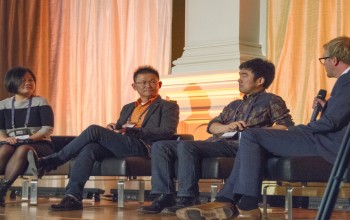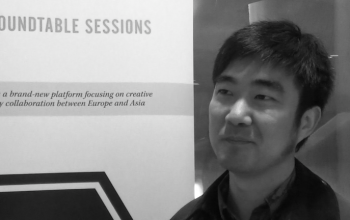Hey, who are you and what do you do?
My name is Lua Zhou. I’m from China and work for a video website called LETV.com. We offer both free and subscription-based content. We combine the business models of HULU and Netflix.
How does your business model work? How is your company financed?
We’re a group company and LETV.com is our video website. We buy and produce our own content. We secure sponsorship from our clients for the content we produce ourselves. We have an advertising agent, who helps us get product placements. Of course, we get money from subscriptions, too.
How many viewers do you have and what kind of content is most popular?
We have 50 million viewers on a daily basis on our website, with 700,000 regular subscribers. TV programs and dramas are most popular right now. One of the TV dramas we offer is the year’s biggest hit and it had a billion page views.
What are the big trends at the moment and why?
Controversial things and entertaining things. Talent shows, like Voice of China. It’s huge over the internet right now. It generates headlines and discussion: who’s going to win, what the judges do, was it wrong or right… You can also enjoy the music.
What kinds of people use your services?
Video website netizens. There are an estimated 350 million video website users in China. I think all of them are our audience.
There are an estimated 350 million video website users in China
Do a lot of people watch programs on mobile phones?
Watching TV on the mobile is very popular. Almost all Chinese video websites have their own mobile app.The number of mobile internet users is expected to hit 600 million this year, surpassing the amount of regular internet users for the first time.
You also produce your own movies. Can you tell us a little about it?
LETV.com is a website, so we produce short films and network TV drama for PCs, tablets and mobile phones. We also have a sister company LEVP, which works in movie production and distribution. It’s one of the biggest of its kind in China. They recently coproduced a movie called Expendables 2 with an American company and took care of the Chinese distribution themselves. It’s a huge hit and made 250 million in the box office.
Who pays for the content?
We buy it from a variety of copyright owners: production companies, movie companies, TV stations… We pay for content with the money we earn. We buy the local content from domestic companies. We own 60 to 70 percent of the Chinese TV programs and movie content. We sell it to other network companies. That’s another source of income.
Do you have foreign content?
We have some foreign content, like Expendables 2, if you can call it foreign… We’re working on increasing the share of foreign content. We’re talking to Japanese companies about animation, which is very big on our site. We’re launching a sports channel this year, so we’re buying rights to sporting events.
Is the Chinese audience interested in watching foreign films or programs? From which countries?
For movies the biggest is still America. For TV drama it varies: Korean, Japanese, British and American soap operas are all popular.
Are the foreign programs and films dubbed into Chinese?
Yes, by professional companies.
Does the content you produce yourself get pirated? Do people share your content illegally? How big a problem is piracy for the Chinese entertainment industry?
We protect our copyrights. Piracy has always been a problem, which is why we have a big copyright department. We track our copyrights. If it gets pirated, we take legal action.
You also have mobile TV services. Can you tell us about that?
We have a mobile application that allows viewers to watch the content from LETV.com. It has all the same content, but no ads before the videos.






